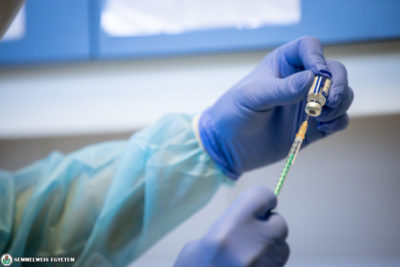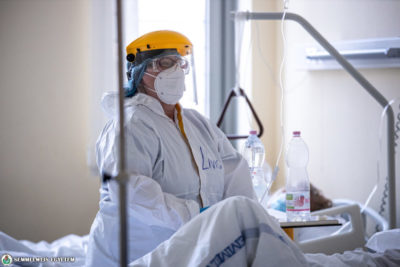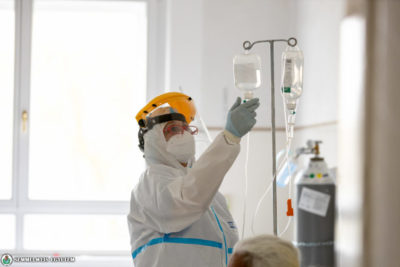Semmelweis University has increased the capacity of the individual psychological counseling service available to staff members and students, and new online group events are also being launched. They are designed to help process the psychological burdens of emergency COVID care. The university has also relaunched telephone counseling and crisis lines, and training materials are being compiled for students involved in volunteering to help them prepare for the most difficult situations.
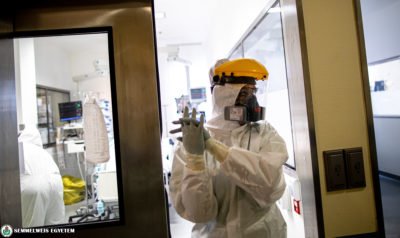 Semmelweis University is the largest institution providing COVID care in Hungary, and the physicians and health care personnel working here have been at the forefront of the epidemic for more than a year now. Currently more than 800 patients are being treated related to coronavirus at the departments, nearly 650 of whom are COVID-positive. So far, more than 6,500 university students have taken part in epidemic control in addition to their studies, and now, during the third wave, more than 700 of them have applied to volunteer at university departments.
Semmelweis University is the largest institution providing COVID care in Hungary, and the physicians and health care personnel working here have been at the forefront of the epidemic for more than a year now. Currently more than 800 patients are being treated related to coronavirus at the departments, nearly 650 of whom are COVID-positive. So far, more than 6,500 university students have taken part in epidemic control in addition to their studies, and now, during the third wave, more than 700 of them have applied to volunteer at university departments.
In view of the extraordinary epidemic situation and the increased number of cases, the university has further developed the network established for the psychological support of those involved in COVID care. The capacities of the Student Psychology Counseling Service (Student Counseling) operated by the Institute of Behavioral Sciences were already increased during the second wave, adjusted to the needs, and the Employee Psychology Counseling Service, which has been operating since last December, is currently being expanded. The latter is jointly organized by the Institute of Behavioral Sciences and the Semmelweis Health Promotion Centre.
The crisis line established by the Department of Clinical Psychology for health care workers has been relaunched, and the Institute of Behavioral Sciences’ telephone counseling service for students is also operating again.
Help for students:
-
Counseling helpline for students: 06/20/670/1928 – between 10:00-12:00 a.m. or 5:00-7:00 p.m. on weekdays
-
Group for students providing COVID care: on Thursdays from 5:00 to 6:30 p.m., registration at least 24 hours before event start on the website of the Institute of Behavioral Sciences
-
Student Psychological Counseling Service (Student Counselor): application at diaktanacsado@med.semmelweis-univ.hu, more information on the website of the Institute of Behavioral Sciences
Help for employees:
-
Employee Psychology Counseling Service: online counseling by prior appointment. Registration on the website of the Semmelweis Health Promotion Centre
-
COVID crisis line for healthcare workers: 06-1-459-1493 (call: from 8.00 a.m. to 4.00 p.m. on weekdays), crisis line – Call for Help: 06 1770-7333 (available 24 hours for free) – More information on the website of the Department of Clinical Psychology
-
Employee Psychology Support Group: on Mondays between 6:00-7.30 p.m. (online), registration on the website of the Semmelweis Health Promotion Center, at least 24 hours before event start
“The Institute of Behavioral Sciences will launch two separate support groups for students and staff involved in COVID care”, said Dr. György Purebl, Director.
The open group of students meets every Thursday via Zoom between 5:00-6.30 p.m., it is possible to join once or several times, after pre-registration. In the group there is an opportunity to alleviate and get rid of the psychological burdens arising during the care, to discuss issues related to difficult situations and difficult patients, and participants are provided with recommendations on how to cope with the increased emotional burden. There will be a similar group for employees involved in COVID patient care, every Monday from 6:00 p.m. to 7.30 p.m.
Based on international examples, Dr. György Purebl pointed out that the use of psychological support is not the highest at the peak of a health crisis situation, when the workload is also the highest, but afterwards. That is why they also anticipate that the demand will continue to grow as the epidemic subsides, therefore they plan to maintain a university counseling support network in the long run. The director of the institute also said that the current epidemic situation is a new situation for everyone, as there has been no such pandemic in Europe for 102 years. Students also have to contend with the rapid transition that exists between the “university desk” and the challenging working environment.
To support students involved in volunteering, the university also compiles an easy-to-read, quick-to-learn training material to help them deal with the most difficult situations.
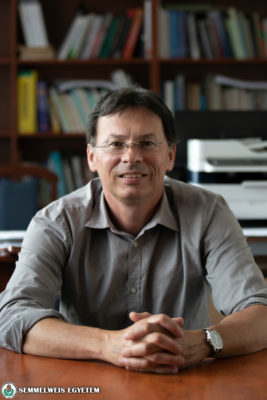 According to the experiences of Dr. György Purebl, for young people these include communicating bad news and treating patients who show aggression and anger. In connection with the latter, according to the expert, students should be made aware that anger and aggression are not directed against them, but this may be a psychological reaction to the difficult situation and to fears in the case of some patients.
According to the experiences of Dr. György Purebl, for young people these include communicating bad news and treating patients who show aggression and anger. In connection with the latter, according to the expert, students should be made aware that anger and aggression are not directed against them, but this may be a psychological reaction to the difficult situation and to fears in the case of some patients.
“There are proven communication and psychological solutions for every situation, and we present them in the materials”, said the director of the institute.
The director of the Institute of Behavioral Sciences also listed some easy-to-use methods that can help young people cope with the new situation:
-
In difficult situations, we should always be aware of what we need at the particular moment, what can help us personally (talk, family time or rather loneliness, collegial support, etc.)
-
We are all different, we can bring the maximum of our abilities in different ways. We should not compare ourselves to others, but we should get the most out of our own abilities, find out what our strengths are (e.g. there are those who are stronger in supporting and helping patients in difficult situations, while others do not become tired rapidly and work more easily for 12 hours, and there are those whose dexterity is very good, others have good communication skills)
-
A healthy lifestyle is very important in enduring psychological burdens, exercise is one of the best stress relieving factors, which is why we should try to incorporate it in some tense situation, but if possible, not at the expense of sleep
Dr. György Purebl emphasized that in spite of the extraordinary situation, he is experiencing outstanding coping skills in the case of both students and staff members.
“It is certain that there will be a special generation of medical and healthcare workers who have socialized as students during a pandemic. I think that they will be more combative and confident even as a career starter and can say in retrospect that they belong to the generation that have become physicians in an extremely sharp situation”, Dr. György Purebl emphasized.
Pálma Dobozi
Photo: Attila Kovács – Semmelweis University
The featured image is only illustration.
Translation: Katalin Illés-Romhányi
